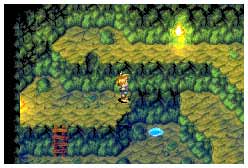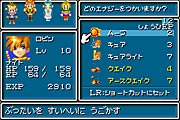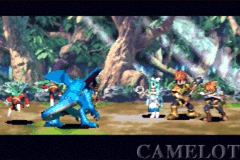 |
Golden Sun - Retroview |
 |
Like a good salesman
By: Phillipe Richer
| Review Breakdown |
| Battle System |
7 |
| Interface |
6 |
| Music/Sound |
8 |
| Originality |
6 |
| Plot |
3 |
| Localization |
5 |
| Replay Value |
6 |
| Visuals |
9 |
| Difficulty |
Easy |
| Time to Complete |
22-28 Hours
|
|
| Overall |
 |
| Criteria
|
The small team of developers called Camelot were hard at work for a long while on their GBA RPG called Golden Sun, and gamers had the joy to witness the fruits of their labor in November 2001. Many gamers quickly hailed the game as a true gem, going as far as to call it a redefined interpretation of old school gaming. In reality, the game has many weak points, but it still possesses that inexplicable charisma that keeps you hooked until the very end.
The ancient power of Alchemy is about to be revived by a group of powerful warriors calling themselves the "prophets". Four youths from across the world, all possessing a strong innate affinity to the powers of psynergy, will join together to help their loved ones while at the same time learning about the prophets cause. The four elemental lighthouses sustain the power of the planet and your mission will be to protect those pillars of hope at all cost - or else destruction will soon befall your beloved land.
Golden Sun proposes a normal turn-based system with four characters while putting a major twist in the concept. Your characters are all "adepts", extremely gifted people capable of harnessing the power of djinns and psynergy better than anyone else. To obtain more spells, power, and skills you'll need to search the world looking for the many djinns of four different elemental alignments: Mercury, Venus, Mars, and Jupiter to represent the powers of water, earth, fire, and wind respectively. You equip djinns on any character you like to provide stat boosts and to change their adept class, which defines what psynergy spells they can use inside and outside of combat. Trying different djinn combinations on your characters will prove to be a lot of fun, since many battle strategies can emerge depending on your chosen classes. Using psynergy consumes psynergy points (PP), which can unfortunately recover naturally over time. I say unfortunately because this aspect saps a lot of challenge out of fighting. Nevertheless, battles can be difficult at times depending on your party's composition and the available psynergy spells.

|
| For once, dungeon exploration is a hoot.
|
|
Djinns have three different states; ready, standby, and recover. When a djinn is in ready mode, its power will be added to the character allowing him to use various psynergies while also raising his stats. If you select the standby mode outside of combat, or if you use the djinn's special ability during an altercation, it will be standing by waiting to be used to summon powerful attacks. Once a djinn's power is used for summoning, it will revert to recovery mode for a short lapse of time. This battle concept works well in some areas but fails in others. For one, it works very well during boss battles, because if you decide to summon like crazy then your stats will be greatly reduced, making you an easy prey for the enemy. On the other hand, it makes normal encounters far too easy near the end since you can easily wipe-out the opposition using only one summon. There should've been more restrictions attached to summoning or at least a longer recovery time for your djinns. Also, there are seven djinns of each alignment, and four different levels of summons, each requiring the matching amount of djinns in standby mode.
The interface can be quite annoying on many occasions. The biggest disturbance is the fact that the action and the menu buttons on the field are the same, meaning that you'll often open the menu when you rather wanted to examine something. The menu can also be opened using the select button so that was one major blunder on Camelot's part. Also, menus are no models of simplicity. Equipping djinns, items, and armors will prove to be harder than it should be. However, dungeon exploration is an absolute treat and is in my opinion what makes Golden Sun fun to play. Hostile environments are filled with interactive features, forcing you to make good use of your passive psynergy spells. You'll have to create pillars of ice, tear bushes apart, or move large boulders to advance through the game. The amount of "puzzles" is just right, and the large variety of them makes every dungeon memorable, which is quite a feat in my book.
Camelot obtained the expertise of the very talented Motoi Sakuraba-san to compose the game's soundtrack, and the result is quite eloquent. I am not a huge fan Sakuraba-san's work in Star Ocean 2, but this soundtrack along with Valkyrie Profile's convinced me that the man has talent. The opening composition in Golden Sun is a prodigious piece, while the overworld theme is also an absolute joy to listen to. Almost every town and dungeon is accompanied by some very good music, while the impact of many events is greatly heightened by superb pieces. The soundtrack contains some weak points here and there, but the GBA's sound card is used to its full potential in practically every instance. The exuberant atmosphere of battles is achieved thanks to the awesome sound effects heard during combat. Every spell and special skill sounds terrific, especially summons, although the sound of clashing weapons seems a little bland compared to the greatness of the whole.

|
| Japanese or not, the menus are hard to navigate. |
|
Only half of the entire plot of the Golden Sun saga is presented in the first game. There's nothing to get excited about here because the characters, enemies, and plot events don't present anything new or exciting. Four teens with great powers will try to stop four other bad guys also with great power, and the core of the plot stays pretty close to that throughout its entirety. There are virtually no plot twists at all, so the objective of your quest will remain the same along the entire game, which is to recover the elemental stones sealing the power of the four lighthouses. The events directly related to the plot could be counted on one hand, so the meat of the adventure will rather come from your meetings with various characters each with their own share of troubles. The game seems to be made up solely of mandatory side-quests, which says a lot about the plot's complexity and depth. Not to say it isn't fun to help every person in need, but the plot itself still stinks.
The game's localization seems to have come from a different era given its lack of personality. The characters in your party all sound the same, and NPCs don't emanate with much charisma either. It's a serviceable job, but dialogues sometimes tend to last forever. I even started screaming angrily at the screen for the characters to stop talking.
Aside from a few side quests and the acquisition of all 28 djinns, there isn't much to do on a second playthrough with Golden Sun. You sure won't play the game again to better understand the simple plot, so the appeal lies mostly in the fun battles and the ear and eye-candy. Given its short length (about 22-28 hours) and the simple fun it provides, I did play the game a second time, which proved to be quite enjoyable anyway.

|
| The game's beauty cannot be denied. |
|
The visual feats accomplished in Golden Sun prove once and for all that the GBA is a powerful gaming platform indeed. Characters look awesome on the field, and both the dungeons and the towns appear incredibly luscious and attractive. The world map is also very well designed and further sharpens your adventurous spirit with its beauty and vastness. The game shines even brighter in battles, where the attack animations are splendid and the spell effects absolutely breathtaking. The many summons in particular look totally dazzling. The artistic beauty of the game is just as keen as its technological refinements. The only reproach I could address is the slightly inferior character animations on the field, but aside from that, everything is superb.
Golden Sun is far from being a perfect game, what with its lackluster interface, basic plot, and drab localization. For those reasons, it does sound like an older RPG. However, this game's strengths rather lie in its great soundtrack, beautiful visuals, and entertaining exploration. There's nothing incredible about Golden Sun, but it's a strangely enjoyable game nonetheless. Camelot sure succeeded in selling us their product, however flawed it might be - just like a good salesman.
|










